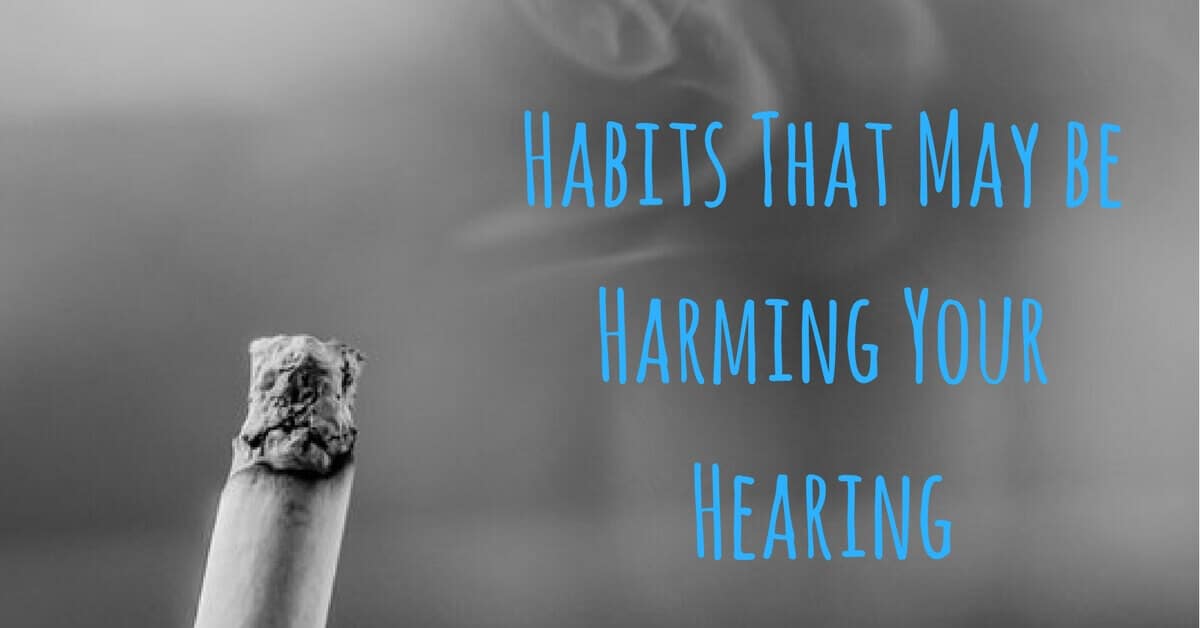Hearing is a little bit like that line from the Joni Mitchell song: “Don’t it always seem to go that you don’t know what you got ‘til it’s gone.” As an invisible sense that is always on, we tend not to notice it until something feels strange, like a stuffiness in our ears or sounds that suddenly seem softer and less accessible.
While some forms of hearing loss may occur due to factors beyond our control, there are certain habits we can cut down or avoid to bolster our hearing health. Below are three habits that may harm your hearing and what you can do about it.
Smoking Cigarettes
At this point, most of us know that smoking cigarettes is terrible for our health. Since the mid-1960s, the US Surgeon General has made a concerted effort to educate and warn the public of the myriad health risks that accompany smoking. Still, people continue to smoke, while others are in the process of quitting.
In addition to increasing the risk for heart disease and lung cancer, smoking cigarettes can seriously harm your hearing health. According to Healthy Hearing, “The chemicals emitted by smoking cigarettes affect the inner ear’s ability to transmit vibrations. The more you smoke, the greater risk for damage – not only your hearing, but also the hearing of the people you love most. Studies show that adolescents exposed to second-hand smoke were almost twice as likely to experience low-frequency hearing loss as those who had no exposure.”
How does this happen? Well, in order for you to hear sounds, an intricate auditory process takes place. First, a sound wave enters your ear and makes its way to the eardrum, where the wave is turned into vibrations. These vibrations make their way to the inner ear, where they are picked up by inner ear hair cells, which are responsible for translating sound vibrations into neural signals. These signals make their way to your brain, where they are registered as sounds you know and recognize.
Cigarettes are chockful of harmful chemicals, including nicotine and formaldehyde, which could permanently damage your inner ear hair cells. In another health-related issue, smoking could harm your circulatory system, which feeds fresh oxygen to your inner ear environment. Problems with your circulatory system, such as high blood pressure, could lead to issues with your inner ear hair cells as well. Damage to these cells could lead to permanent hearing loss.
Avoiding the Dentist
Most of us hate going to the dentist because of those scary instruments they use. Ironically, dentists and dental assistants are at an increased risk for hearing loss and tinnitus due to the high-frequency sounds of their drills and tools (if they do not use hearing protection). Still, avoiding the dentist when you experience major dental issues could lead to hearing loss. Unhealthy gums and teeth could lead to infection, which could eventually spread to other areas of the head and neck area, including your ears. Infection in this area could cause inflammation or impede circulation. Over time, this could harm your hearing health.
Make sure that you follow the prescribed dental routine of flossing and brushing, and visit your dentist regularly for cleanings and check-ups. Don’t let an infected tooth or gum go for too long without seeking medical attention, as this infection could be harmful if it spreads.
Poor Diet & Inactivity
Because your auditory system relies on a healthy supply of oxygenated blood, it is important to make that your heart is healthy. According to the Mayo Clinic, “For most healthy adults (age 19 to 64), the Department of Health and Human Services recommends exercises of at least 150 minutes of moderate aerobic activity or 75 minutes of vigorous aerobic activity a week.”
Our bodies and abilities differ, so it’s important to find the best exercise that works best for you. Depending on your level of health and ability, you may want to consult with your primary care physician before begin a new workout program.
Additionally, did you know that your diet could influence your hearing health? Recent studies have found that a diet rich in antioxidants and omega-3, as well as vitamins A and C, and zinc and potassium, could help improve your hearing health.
Visit Us at Desert Valley Audiology
An annual hearing test is one of the best habits you can form when it comes to your hearing health. Establishing a baseline of your hearing abilities and identifying a hearing loss if it occurs ensures that you will stay connected to the world around you. Schedule an appointment with us at Desert Valley Audiology today.

